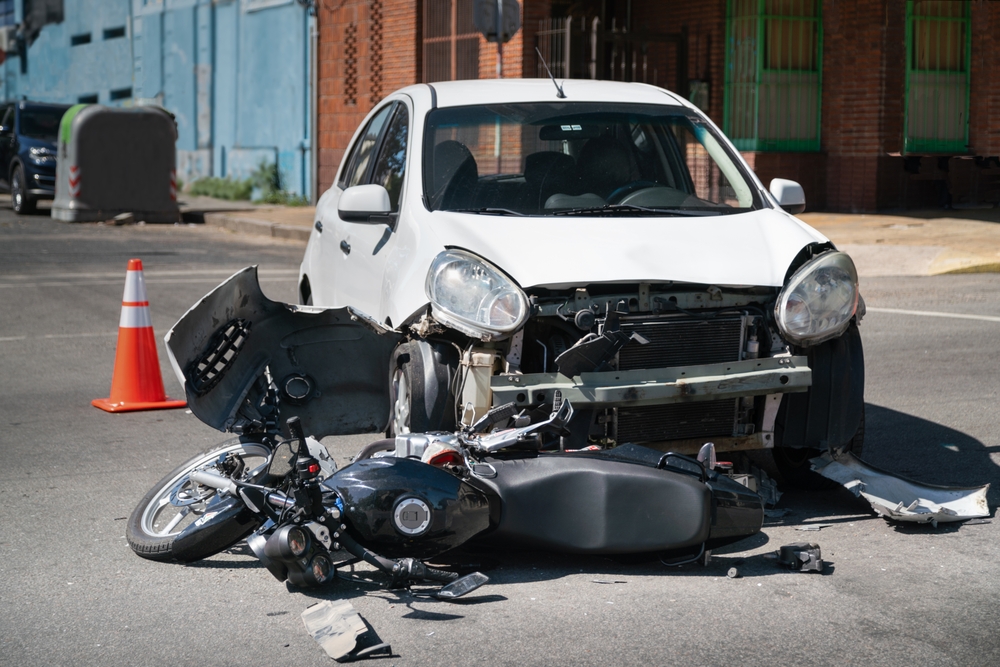Your legal options for passengers injured in motorcycle accidents depend on identifying the at-fault parties and the available insurance policies. However, you have a right to pursue compensation for your injuries, even if the situation feels complicated.
Exploring your legal options as an injured motorcycle passenger empowers you to seek the recovery you need. A personal injury lawyer can clarify the path(s) toward compensation based on your specific situation.
Key Takeaways for Legal Options for Injured Motorcycle Passengers
- Injured passengers can often seek compensation from multiple parties, including the motorcycle operator and the driver of another involved vehicle.
- Your personal relationship with the motorcycle driver doesn’t prevent you from filing an injury claim against their insurance policy.
- Several insurance policies, such as Bodily Injury (BI) liability and Uninsured Motorist (UM) coverage, may provide avenues for your financial recovery.
- As a passenger, you typically bear no fault for the accident, which strengthens your position in a personal injury claim.
- Taking prompt action to investigate the crash and document your damages helps protect your right to a full recovery.
Identifying At-Fault Parties in a Motorcycle Passenger Accident
After a crash, determining who caused the accident forms the foundation of your personal injury claim. As a passenger, you have the unique ability to file a claim against any driver whose negligence contributed to your injuries.
This may include the person you were riding with, the driver of another vehicle, or both. A thorough investigation uncovers the facts needed to establish liability.
Claims Against the Motorcycle Operator
Many passengers hesitate to hold the motorcycle operator accountable, especially when that person is a friend or relative. However, a claim is typically made against their insurance coverage, not their personal assets.
If the operator’s actions—such as speeding, driving while impaired, or making an unsafe lane change—caused the crash, their insurance carrier is responsible for your damages. In this scenario, you can file a claim to recover for medical expenses and lost wages caused by their negligence.
An attorney can handle communication with the insurance company, allowing you to focus on your recovery while preserving your personal relationship.
Claims Against Another Vehicle’s Driver
Frequently, the driver of another car or truck is responsible for a motorcycle accident. Many drivers fail to see motorcycles or misjudge their speed and distance, leading to devastating collisions.
Common examples of another driver’s negligence include:
- Unsafe Lane Changes: The driver merges into the motorcycle’s path without checking their blind spot.
- Failure To Yield: The driver turns left at an intersection in front of an oncoming motorcycle.
- Distracted Driving: The driver is texting, talking on the phone, or otherwise not paying attention to the road.
- Following Too Closely: The driver tailgates the motorcycle, leaving no room to stop in an emergency.
In these situations, you would file a claim against the other vehicle driver's auto insurance policy. Proving their negligence is key to a successful motorcycle passenger injury claim. An investigation helps secure evidence, such as traffic camera footage and witness testimony, to support your case.
Claims Against Other Liable Parties
In less common scenarios, other entities contribute to the accident. For example, a government agency may have failed to properly maintain a road, leaving a dangerous pothole that caused the motorcycle to lose control.
In other cases, a defective motorcycle part, such as faulty brakes, may have been the cause. These types of cases require a detailed analysis to identify the responsible party. Pursuing a claim against a government body or a large manufacturer involves complex legal procedures.
However, investigating all potential sources of liability is a key part of reviewing the available legal options for passengers injured in motorcycle accidents. This step helps maximize your potential for a fair recovery.
Navigating Insurance Coverage as an Injured Passenger
Understanding which insurance policies apply to your injuries is a critical part of the process. Several sources of coverage may be available, and a personal injury lawyer can help you identify and pursue all of them. Each policy has different limits and requirements for filing a claim.
The primary sources of recovery for your motorcycle passenger injury claim often include the following:
- Motorcycle Operator's Policy: The motorcycle driver's Bodily Injury (BI) liability insurance is the primary source of compensation if they’re at fault. This coverage pays for your medical bills and lost wages up to the policy limits.
- Other Driver's Auto Policy: If another motorist caused the crash, you file a claim against their BI liability policy.
- Your Own Auto Policy: If you own a vehicle with Uninsured/Underinsured Motorist (UM/UIM) coverage, you may be able to use it. This coverage steps in if the at-fault driver has no insurance or not enough insurance to cover all your damages.
- A Resident Relative's Policy: In some circumstances, you might receive coverage under the UM/UIM portion of an auto policy owned by a family member who lives with you.
Building a Strong Foundation for Your Claim
From your home, you build a strong foundation for your motorcycle passenger injury claim. Careful documentation of your journey after the accident provides the factual proof needed to pursue compensation.
Documenting Your Medical Journey
The records from your doctors and therapists tell the story of your physical injuries, so keep every piece of paperwork you receive, including hospital discharge forms, diagnostic test results, and bills for treatment. Following every medical recommendation shows you’re participating in your recovery.
This detailed medical history creates an undeniable link between the crash and your injuries. It gives your attorney the evidence needed to project your future medical costs.
A complete record prevents an insurance company from arguing that you exaggerated your injuries or that they resulted from a different cause.
Tracking Financial Losses
The financial impact of a crash extends far beyond the initial hospital bills. A comprehensive log of every expense you incur because of your injuries supports your claim for a full recovery. Your lawyer uses this documentation to calculate your total losses.
You should track several categories of losses, including:
- Medical-Related Expenses: Save receipts for all prescription medications, over-the-counter supplies, and necessary medical equipment, such as crutches or braces.
- Travel Costs: Keep a mileage log for every trip you make to doctors' offices, physical therapy sessions, or pharmacies.
- Lost Income: Gather your pay stubs from before the accident to establish your regular earnings and keep track of every workday you miss.
- Replacement Services: Document payments made for services you can no longer perform yourself due to your injuries, such as lawn care or house cleaning.
Creating a Personal Record of Your Recovery
Some of the most significant effects of an accident aren’t visible on a medical bill. A personal journal provides a powerful way to document your daily experience. Write down your pain levels, the physical activities you can no longer perform, and the emotional challenges you face.
This record offers a clear picture of how the injuries affect your quality of life and gives a voice to your pain, suffering, and loss of enjoyment. For an insurance adjuster or a jury, this personal account often illustrates the human cost of the accident more effectively than any other piece of evidence.
Recovering Damages As an Injured Motorcycle Passenger
The goal of a personal injury claim is to provide financial compensation for the losses you suffered because of the accident. These losses (damages) fall into two main categories: economic and non-economic.
Calculating the full extent of your damages requires careful documentation and often involves input from medical and financial professionals.
Common recoverable damages for a motorcycle passenger injury claim include:
- Past and Future Medical Costs: You can recover the cost of all medical care related to the accident, including hospital stays, surgeries, physical therapy, and any anticipated future treatments.
- Lost Wages and Earning Capacity: This covers any income you lost while unable to work and compensation for any permanent disability that reduces your ability to earn a living in the future.
- Physical Pain and Emotional Distress: You can receive compensation for the physical pain your injuries have caused, as well as the emotional suffering and mental anguish resulting from the traumatic event.
- Scarring and Disfigurement: This compensates you for any permanent scars, disfigurement, or physical changes to your appearance caused by the accident.
- Loss of Life Enjoyment: This payment covers the loss of your ability to participate in hobbies, recreational activities, and other daily life experiences that you previously enjoyed.
- Punitive Damages: In rare cases involving extreme recklessness, such as a driver engaging in street racing or being severely intoxicated, a court may award punitive damages. Courts award these damages to punish the wrongdoer and deter similar conduct in the future.
How a Lawyer Protects Your Legal Options After a Motorcycle Accident
After a serious motorcycle accident, trying to handle an injury claim on your own while recovering from injuries creates significant stress. An experienced personal injury lawyer handles the entire legal process, allowing you to focus on your health.
A lawyer’s involvement demonstrates to insurance companies that you’re serious about receiving a fair outcome for your motorcycle passenger injury claim.
Here is how a lawyer helps with your claim:
- Thorough Investigation: Your personal injury attorney conducts a full investigation into the crash. They gather police reports, interview witnesses, obtain video footage, and may hire accident reconstructionists to prove exactly how the accident happened and who was at fault.
- Insurance Communication: Your lawyer manages all communications with all involved insurance companies. They handle adjusters' questions, submit all necessary paperwork, and protect you from tactics adjusters use to minimize your claim's value.
- Accurate Damage Calculation: Your legal team works with your doctors to document the full extent of your injuries and future medical needs. They may consult financial professionals to calculate your total lost wages and any impact on your future earning ability.
- Skilled Negotiation: Your lawyer leverages the evidence to negotiate for a full and fair settlement with the insurance companies. They build a strong case that pressures the insurers to offer a settlement that covers all your damages.
- Courtroom Litigation: If the insurance companies refuse to make a fair offer, your attorney can file a lawsuit and present your case to a judge and jury to fight for the compensation you need.
FAQ for Legal Options for Passengers Injured in Motorcycle Accidents
What if the Motorcycle Driver Is My Friend or Family Member?
You can still file a claim even if the motorcyclist is a friend or family member. A personal injury claim is made against the driver’s insurance policy, not against them personally. The purpose is to access the coverage they have been paying for to handle situations like yours.
An attorney can manage all communications, preserving your personal relationship while you seek the compensation you need.
How Long Do I Have To File an Injury Claim in Florida?
In Florida, you generally have two years from the date of the accident to file a personal injury lawsuit. This deadline is known as the statute of limitations. Failing to file a lawsuit within this time frame will likely result in the court dismissing your case.
What Evidence Helps My Case as an Injured Motorcycle Passenger?
Several types of evidence strengthen a motorcycle passenger injury claim, including the official police report, photos and videos of the accident scene and your injuries, contact information for any witnesses, and all your medical records and bills.
Preserving any damaged clothing or property from the accident also helps your lawyer flesh out the story of the accident.
What if Both the Motorcycle Operator and Another Driver Share Fault?
When multiple drivers contribute to a crash, you can file a personal injury claim against each at-fault party. As a fault-free passenger, you can pursue compensation from both the motorcycle operator's insurance and the other vehicle driver's insurance.
The insurance companies will typically investigate and assign a percentage of fault to their respective clients, but your right to recover damages from all negligent parties remains.
Do Injured Motorcycle Passengers Still Have Legal Options When They Don’t Wear a Helmet?
Yes, you can still file a claim. Florida law doesn’t require motorcycle riders over the age of 21 to wear a helmet if they have at least $10,000 in medical benefits coverage.
However, the insurance company may argue that your failure to wear a helmet contributed to the severity of your injuries. They may try to reduce your compensation based on Florida’s modified comparative negligence rules.
Focus on Your Future, We’ll Focus on the Fight
Your energy right now should be directed toward your physical recovery. Focusing on the legal and financial details of an accident claim adds a heavy burden. A skilled attorney can take the weight off your shoulders by managing your personal injury claim from start to finish.
At Holliday Karatinos Law Firm, we’re ready to help you explore your legal options as an injured motorcycle passenger and fight for your recovery. Contact us today for a free consultation at (352) 597-0009.











